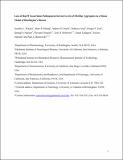Loss of Hsp70 Exacerbates Pathogenesis But Not Levels of Fibrillar Aggregates in a Mouse Model of Huntington's Disease
Author(s)
Lindquist, Susan; Steele, Andrew D.; Wacker, Jennifer L.; Huang, Shao-Yi; Aron, Rebecca; Lotz, Gregor P.; Nguyen, QuangVu; Giorgini, Flaviano; Roberson, Erik D.; Masliah, Eliezer; Muchowski, Paul J.; ... Show more Show less
Downloadmain article (279.9Kb)
OPEN_ACCESS_POLICY
Open Access Policy
Creative Commons Attribution-Noncommercial-Share Alike
Terms of use
Metadata
Show full item recordAbstract
Endogenous protein quality control machinery has long been suspected of influencing the onset and progression of neurodegenerative diseases characterized by accumulation of misfolded proteins. Huntington's disease (HD) is a fatal neurodegenerative disorder caused by an expansion of a polyglutamine (polyQ) tract in the protein huntingtin (htt), which leads to its aggregation and accumulation in inclusion bodies. Here, we demonstrate in a mouse model of HD that deletion of the molecular chaperones Hsp70.1 and Hsp70.3 significantly exacerbated numerous physical, behavioral and neuropathological outcome measures, including survival, body weight, tremor, limb clasping and open field activities. Deletion of Hsp70.1 and Hsp70.3 significantly increased the size of inclusion bodies formed by mutant htt exon 1, but surprisingly did not affect the levels of fibrillar aggregates. Moreover, the lack of Hsp70s significantly decreased levels of the calcium regulated protein c-Fos, a marker for neuronal activity. In contrast, deletion of Hsp70s did not accelerate disease in a mouse model of infectious prion-mediated neurodegeneration, ruling out the possibility that the Hsp70.1/70.3 mice are nonspecifically sensitized to all protein misfolding disorders. Thus, endogenous Hsp70s are a critical component of the cellular defense against the toxic effects of misfolded htt protein in neurons, but buffer toxicity by mechanisms independent of the deposition of fibrillar aggregates.
Date issued
2009-07Department
Massachusetts Institute of Technology. Department of Biology; Whitehead Institute for Biomedical ResearchJournal
Journal of Neuroscience
Publisher
Society for Neuroscience
Citation
Wacker, Jennifer L. et al. “Loss of Hsp70 Exacerbates Pathogenesis But Not Levels of Fibrillar Aggregates in a Mouse Model of Huntington's Disease.” J. Neurosci. 29.28 (2009): 9104-9114.
Version: Author's final manuscript
ISSN
0270-6474